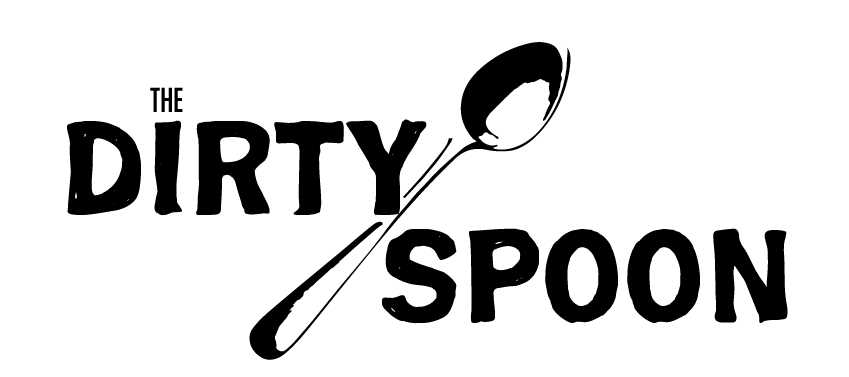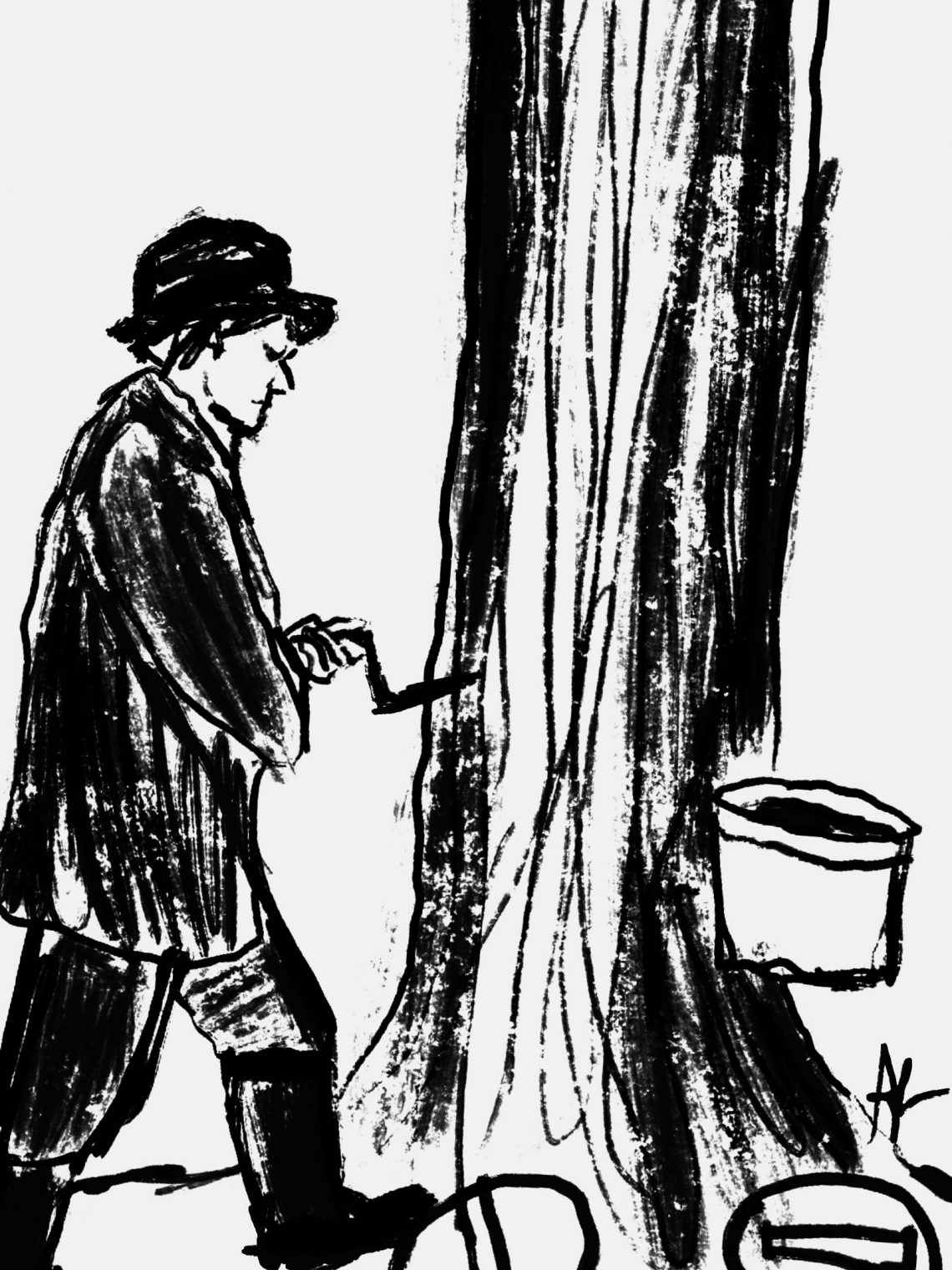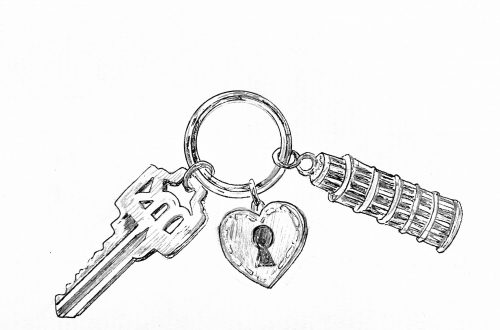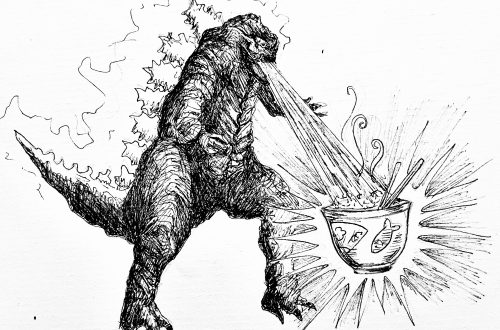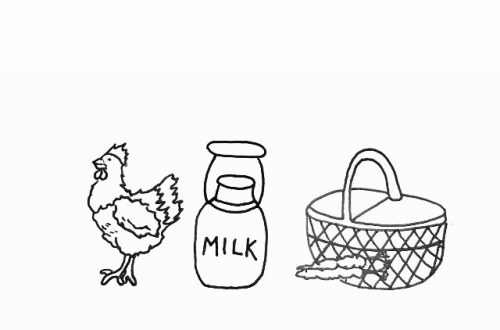by Janelle Carlson
Janelle’s essay is featured in episode 46 of The Dirty Spoon Radio Hour.
The Mighty Maple
We don’t just make food. Food makes us.
This is the wisdom behind the old maxim “Let food be thy medicine and medicine be thy food.” More recently, we are learning or relearning, perhaps, that food can also make us sick as research into the negative impacts of ultra-processed food is beginning to show its links to illnesses like diabetes, cancer and depression. That’s the hard scientific answer and it’s true but what is missing from the equation is how our food ties us to time and place. The other side of how it helps make us who we are.
Don’t believe me? Consider the case of the maple trees and the peoples’ who have grown up around them. One of the benefits of growing up near the Canadian border has to be access to maple-everything. Maple syrup, of course, but also my beloved maple candies and maple soda. Maples tie us in the North together and to our homes in a way we don’t realize until we leave or until they are, suddenly, no longer there.
Maples are formers and binders of memory. Growing up, I remember a neighbor tapping the tree in his yard. Then there were the high school field trips to watch the sugaring that took place at the local reserve. Even today there are churches that make their own maple syrup for pancake dinners. And, of course, we can be utter snobs about our consumption! My great-aunt, for example, swore that Canadian maples made infinitely better maple syrup and on at least one occasion made the trek to the border returning with lovely leaf-shaped syrup bottles as Christmas presents in the years before you needed a passport. Others argue that local is always better and so, perhaps unfairly, maple syrup from Vermont often receives a look askance at the grocery store. For those of us who could not afford the real stuff, there were always substitutes but the thing was, you always knew they were substitutes.
Again, that’s the thing about food. It’s hardly ever just food. Food at its best and its worst means something. It is a linkage between past, present and future. It’s also a tie to the place where it was produced and consumed. In terms of maples and the goodies they allow us to make it is also about how we learn our environment. More specifically, how we learn to interact with the trees.
It takes work and knowledge of the weather, the different kinds of maples, how to tap and the temperature needed to create maple syrup vs maple sugar vs a burnt mess. But if you, like my neighbor once did, tap your own trees you will also realize that some trees will consistently produce more. That maybe your time would be better spent on one tree vs another. Maybe if you have kids and grandkids you will teach them the work and knowledge they need and you’ll introduce them to that one tree and it will become doubly special.
It was links like these that colonialism interrupted. After all, this relationship between trees and the people who live around them predates the United States and Canada. It was indigenous nations who first developed these ties to maples and the knowledge that allowed the sweetness of maple sugar to enter the world. Much, much later the act of maple sugaring became one of the few indigenous traditions that settlers would assimilate rather than disregard or even attempt to exterminate.
Maple sugaring would go on to become a tradition that tied new occupants to the land and cultures they encountered even as the settler governments of the United States and Canada pushed those families who had originally done the work and safeguarded the trees onto reserves. But the maples like the indigenous peoples would remain and continue to mark the land and the new cultures that sprang up in the North even as maple leaves became identity builders and markers of a new Canadian nation.
Importantly, our relationship with maples as a cultural artifact, growing and tapped tree remains a living tradition even today and Ojibway author Staci Lola Drouillard recounts how the act of maple tapping and sugaring should be a sacred tie between past and present and the gifts we receive from our local ecosystem. I suppose this a little bit similar to how I think about it, too. When I stop at the farmer’s market to buy oodles of goodies made from our maples. The ones I may drive past in the fall. The ones that support people I know. The ones that, if we’re very lucky, my son will visit during a sugaring the way I and my family before me has done. These trees mean something more than what can be encapsulated in what they produce. These trees that are ours and are not with their history that stretches long into the past while being so firmly rooted in the present.
However, like so many of the other sacred ecosystems left around the world, maples and our relationship to them are shifting due to climate change. As the Farmer’s Almanac notes, maple sugaring requires cold winters like those made famous by Laura Ingalls Wilder in Little House in the Big Woods but winter nights even in Wisconsin are not as cold as they used to be.
This has already had a direct impact on the production of true maple-related-everything-as 59 percent of producers have seen the sugaring season shorten and warmer summers lessen the amount of sugar maples produce as well as the amount of carbon they store. Worse for the maples themselves, the lack of snowpack can damage their roots and reduce the ability of tree shoots to grow. Then there is the unknown impact of the Canadian wildfires.
We don’t know how this change will look like in the future but we do know that the maple range will likely be forced to shift northwards and that the maple sugaring will go with them. And while we know how that may impact large-scale production we have yet to reckon with the cultural shifts that this change may bring if we are to lose our connection to this understated marker of time and place.
I don’t know if we can miraculously halt climate change. The selfish child in me wants to ask if there is a way to save this one beautiful thing. I am not an influential scientist or a billionaire who has a foundation at my beck and call. This is not a Save the Maples; Save the World sort of thing. The maples will most likely be fine even if the sugaring will change. But at this moment, I would like to appreciate all the ways that the mighty maples have marked out home.
Original artwork by Alex Knighten
About the Author
